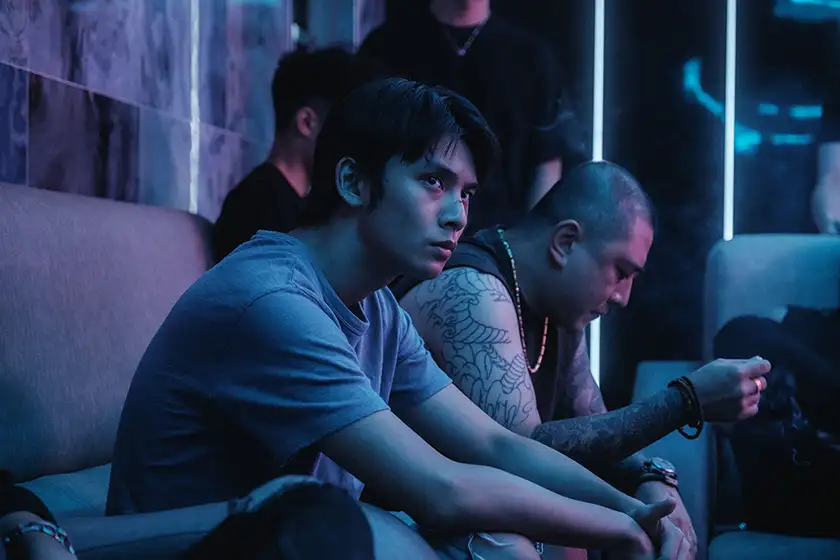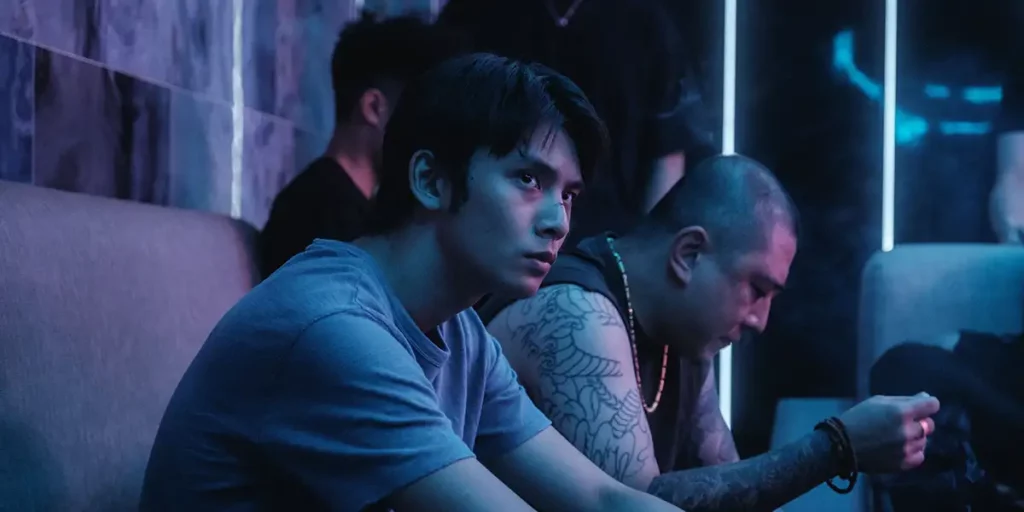With the story of a young man who leads a double life in the Taipei underworld, Locust tells a tale of violence, power dynamics, and the kind of rage you can only survive by drowning it in silence.
Director: KEFF
Genre: Drama, Thriller
Run Time: 136′
Cannes Premiere: May 28, 2024
Release Date: TBA
“A riot is the language of the unheard,” reads a Martin Luther King Jr. quote at the beginning of writer-director KEFF’s Locust, and it’s not hard to make a connection between these words and the film’s protagonist. The 23 year old Zhong-Han (Liu Wei Chen), who spends his days washing dishes at a family restaurant in Taipei, doesn’t talk.
Is he mute? Is not speaking an intentional choice? Or is it a means to survive a world on the verge of collapse? As the film unfolds and we get to know our young protagonist, we tend to lean toward the latter. Zhong-Han leads a double life: by day, he’s a dishwasher, and the restaurant owners seem to have taken him in, as he also sleeps at the restaurant, on a mattress on the floor, and seems to be part of the family. The main issue they’re dealing with, at the moment, are a new landlord who wants them to pay him more money, a severe lack of customers, and electricity that comes and goes, causing all sorts of problems.
But as restaurant owner Rong (An-Shun Yu) and his wife (Yi-Jung Wu) struggle to make ends meet, Zhong-Han is actually making money. By night, he takes the street with a gang of thugs and, together, they do all sorts of violent things, as instructed by their young leader (Devin Pan). As we watch him do anything from threatening to destroy valuable objects and robbing self-defined “influencers” to actually beating people up, we wonder which of his two personas he really is, deep down. But things are even more complicated, because Zhong-Han has just starting going out with a girl (Rimong Ihwar). She works at the local convenience store, and though they can’t communicate in a traditional way, their first dates bring out a softer, sweeter side of him that we hadn’t seen before.
Perhaps Zhong-Han’s violent alter-ego is somehow connected to the large-scale violence happening all around him, as the 2019 Hong Kong protests are taking place, in response to the Hong Kong government’s proposal of a bill that would allow extraditions to China. On TV screens, the police is beating up peaceful protesters on a daily basis, and what Zhong-Han is doing in the Taipei underworld doesn’t feel too different: it’s brutality for the sake of it, used more as an outlet for repressed rage than as a means to achieve real change. But our protagonist leads a precarious existence, and soon, these two very different worlds come to converge – or, rather, crash – into one another.

The first half of Locust is very intriguing. Liu Wei Chen shines as Zhong-Han, immersing us into his universe from the moment we meet him and conveying, with looks alone, all the feelings inside him that are desperately – though subtly – trying to emerge. The sound design (Samuel Aïchoun) adds tension to seemingly uneventful moments, alerting us of impending danger and letting us know whom we shouldn’t trust. As Zhong-Han’s romantic interest, Rimong Ihwar brings much needed heart to the film, and we can’t help but root for her whenever Zhong-Han isn’t being exactly honest about what he does for a living.
There are also various scenes inside a club where KEFF, who’s a multidisciplinary artist and an open-format DJ on top of the movie’s writer-director, brings us to the dance floor with Zhong-Han as he tries to forget his troubles, showing us yet another side to his complex life. It’s clear that KEFF is trying to say something about power dynamics, corruption, social inequality, and how our indifference to brutality has made us selfish and numb. Locust partly manages to send this message across, and there’s a scene in particular that we come back to at the end and acquires a different meaning once we’ve been on this journey.
Sadly, the film is also unfocused, as its overlong second act pretty much consists of the same dynamics applied to different contexts, which makes its overall message remain surface level. Instead of exploring the social themes it cleverly set up in the first half, the second part of the movie tries to delve into Zhong-Han’s own identity while also bringing in a thriller subplot, and sadly fails at both. What results is a series of unlikely coincidences that, on top of the thin characterization, make Locust‘s dialogues and narrative feel soap opera level at best. Even the sound design and cinematography, which worked so well at the start of the film, feel frustratingly repetitive by the end, and Locust‘s own identity gets lost in the process.
Locust is worth the watch for its solid performances and captivating premise, and there are moments when you’ll be captivated by its enigmatic protagonist and fully immersed the world of contradictions that he inhabits. Though the film falters in its second half, it is still a promising debut from a director to keep an eye on.
Locust premiered at the Cannes Film Festival as part of the Semaine de la Critique on May 16, 2024. Read our review of When the Light Breaks!

